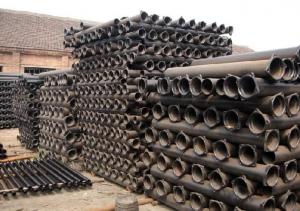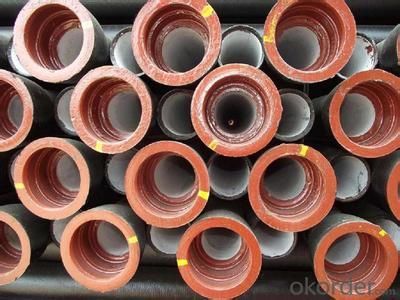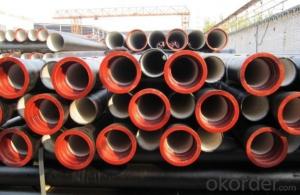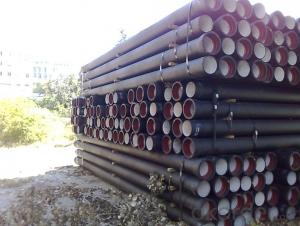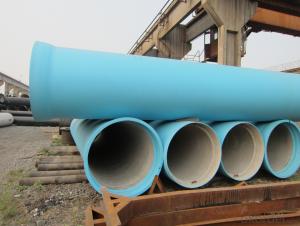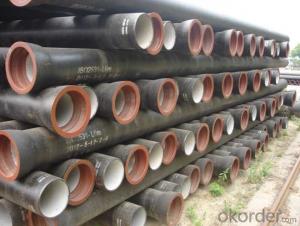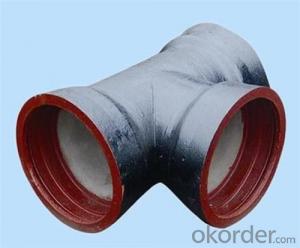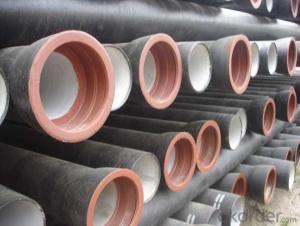Ductile Iron Pipe High Quality from China DN500 EN545
- Loading Port:
- China main port
- Payment Terms:
- TT or LC
- Min Order Qty:
- 1000 m
- Supply Capability:
- 200000 m/month
OKorder Service Pledge
OKorder Financial Service
You Might Also Like
1. Ductile Iron Pipe Description :
1 |
Type:
| The T-type Joint Pipe (Push-on) |
The K-type Joint Pipe | ||
The Self-Restrained Joint Pipes | ||
2 | Standard: | ISO2531, EN545, EN598, etc |
3 | Size: | DN80~2600mm |
4 | Material: | Ductile Cast Iron GGG50 |
5 | Pressure: | PN10, PN16, PN25,PN40 |
6 | Class: | K9, K8, C25, C30, C40 |
7 | Length: | 6m, cut to 5.7m |
8 | Application: | Water supply project, drainage, sewage, irrigation, water pipeline. |
9 | Certificate: | ISO9001, BV, WRAS, SGS |
10
| Internal Coating: | a). Portland cement mortar lining |
b). Sulphate Resistant cement mortar lining | ||
c). High-Aluminum cement mortar lining | ||
d). Fusion bonded epoxy coating | ||
e). Liquid epoxy painting | ||
f). Black bitumen painting | ||
11 | External Coating: | a). zinc+bitumen(70microns) painting |
b). Fusion bonded epoxy coating | ||
c). Zinc-aluminum alloy +liquid epoxy painting | ||
12 | Packing: | Bundles, in bulk |
Note: The coating can also be accordance with customers' requirements. | ||
2. Ductile Iron Pipe Main Features:
1. ISO 2531 or EN 545 Standard K9 Class, K7 Class and C Class
2. ISO 9001 Certificate
3. ISO 2531 & EN 545 Certificate
4. WRAS Potable Water Certificate for Cemen Internal Lining
5. WRAS EPDM Rubber Gasket or NBR Rubber Gasket
6. DN80mm - DN2600mm
7. Black Bitumen or Blue Epoxy Coating
8. Lengh = 6m or cut into 5.6m, 5.7m, 5.8m
9. Client's Brand Customization Allowable
10. Container or Bulk Loading / Shipping
11.Delivery within one Month or According to Client's Order Quantity
12. Support Client or The Third Party Inspection before Shipment
3.Ductile Iron Pipe Images:
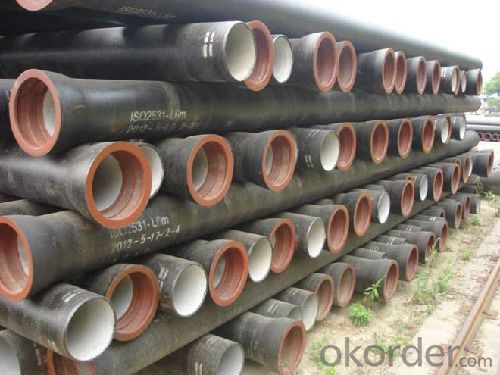
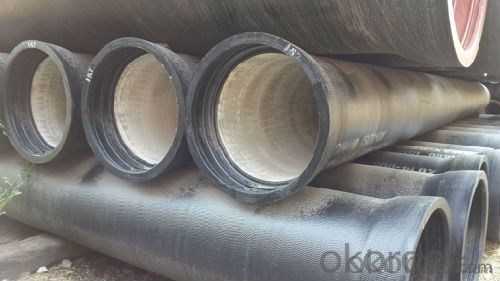
4.Ductile Iron Pipe Specification:
1. ISO 2531 & EN 545 Standard
2. K8, K9, K10 C Class
3. Internal Linings: Portland Cement
4. External Coating: Bitumen/ Epoxy
5. Joint Type: T Joint, K Joint, N1 Joint, MJ Joint and Flange Joint.
6. Shipment: By bulk ship or 20'/40' container
7. Rubber: NBR, SBR, EPDM according to ISO4633/EN681.1
8.Quick Delivery
5.FAQ:
· Industry experience over 20 years.
· Management Systems-Internal Software
· Finished Product Inventory-More Than 5000 Tons.
· Raw Material inventory -Over 8000 Mertic Tons.
· The most convenient transport and prompt delivery.
· Competitive price with best service .
· High technical production line with top quality products.
· High reputation based on best quality products.
- Q: What are the different types of coatings available for ductile iron pipe?
- The different types of coatings available for ductile iron pipe include cement mortar lining, polyethylene sleeving, polyurethane coatings, and epoxy coatings. Each coating offers specific benefits such as corrosion resistance, improved flow characteristics, and protection against external elements.
- Q: Are ductile iron pipes suitable for use in cold climates?
- Yes, ductile iron pipes are suitable for use in cold climates. Ductile iron is known for its excellent strength and durability, making it a reliable choice for various applications, including water supply systems, sewage systems, and industrial piping. In cold climates, where temperatures can drop below freezing, ductile iron pipes are highly resistant to cracking or breaking due to their unique metallurgical composition and structure. They have a high tensile strength and can withstand the expansion and contraction caused by freezing and thawing cycles. Additionally, ductile iron pipes have a smooth internal surface that helps prevent the buildup of ice or sediment, ensuring efficient flow and minimizing the risk of blockages. Overall, ductile iron pipes are a suitable and dependable option for use in cold climates.
- Q: How is ductile iron pipe installed?
- Ductile iron pipe is typically installed using a process called trenchless technology or open-cut method. In the trenchless technology approach, a hole is drilled into the ground and the ductile iron pipe is then pushed or pulled into the hole using hydraulic jacks or winches. This method minimizes disruptions to the surrounding environment and reduces the need for extensive excavation. In the open-cut method, a trench is excavated to the required depth and width for the ductile iron pipe. The trench is then prepared by removing any debris or obstructions and ensuring a stable base. The pipe is then lowered into the trench and aligned properly using laser or surveying equipment. After the pipe is positioned, joints are connected using a rubber gasket or mechanical joint. The joints are typically sealed to prevent leakage. Backfill material is then carefully placed around the pipe, ensuring proper compaction to provide stability and support. The backfill is typically done in layers to avoid excessive settlement. Once the installation is complete, the pipe is tested for leaks and pressure to ensure its integrity. This may involve hydrostatic testing, where the pipe is filled with water and monitored for any signs of leakage or pressure loss. Overall, the installation of ductile iron pipe requires careful planning, excavation, alignment, joint connection, backfilling, and testing. It is essential to follow industry standards and guidelines to ensure a successful and reliable installation that meets the required specifications.
- Q: What is the difference between ductile iron pipes and cast iron pipes?
- Ductile iron pipes and cast iron pipes have different compositions, properties, manufacturing processes, and applications. Ductile iron pipes are made from a type of cast iron known as ductile iron, which contains higher levels of carbon, silicon, and other alloying elements like magnesium. On the other hand, cast iron pipes are made from regular cast iron, which has a higher carbon content and lower levels of alloying elements. In terms of properties, ductile iron pipes are recognized for their high tensile strength, flexibility, and durability. They can withstand higher pressure and have a greater resistance to impact, making them suitable for applications that demand robust performance. Conversely, cast iron pipes are more brittle and fragile, making them susceptible to cracking or breaking under pressure or impact. The manufacturing process differs as well. Ductile iron pipes are formed through centrifugal casting, in which molten ductile iron is poured into a spinning mold. This centrifugal force aids in the even distribution of the molten metal, resulting in a strong and uniform pipe. On the other hand, cast iron pipes are made using sand casting, where molten cast iron is poured into a mold made of compacted sand. This method is less precise and can result in variations in the final product. In terms of applications, ductile iron pipes are commonly used in water and sewage systems, as well as in industrial pipelines that require high-pressure resistance. Cast iron pipes, on the other hand, are typically used in non-pressure applications such as drainage systems or underground sewer lines. To summarize, ductile iron pipes and cast iron pipes differ in their composition, properties, manufacturing processes, and applications. Ductile iron pipes offer greater strength, flexibility, and durability, making them suitable for high-pressure applications, while cast iron pipes are more brittle and commonly used in non-pressure applications.
- Q: How long is the service life of the cast iron pipe, and the time of use of ductile iron pipes?
- When it comes to the service life of nodular cast iron, its maintenance is essential for its long service life. Then, the focus of the maintenance of ductile iron pipe is to pay special attention to, will affect the long-term use of ductile iron pipes, stable operation of socket, row, etc., we should make efforts to these aspects of the mouth without debris. Make sure that the rubber ring of the ductile iron pipe has been smashed with a rubber hammer, and it is not twisted or twisted, and it is uniformly stuck in the slot. Ductile iron pipe in the maintenance process, because of the pneumatic tube axis is buried into the ground, so in the face of a tilt angle of the time, we must be careful, if the resistance is too large, will not force the excavation, in order to prevent the distortion of the rubber ring.
- Q: Are ductile iron pipes suitable for use in hydropower projects?
- Yes, ductile iron pipes are suitable for use in hydropower projects. Ductile iron pipes are known for their strength, durability, and resistance to corrosion, making them ideal for carrying water in hydropower projects. Additionally, their ability to withstand high pressure and adaptability to various ground conditions further supports their suitability for such projects.
- Q: What is the external coating used in ductile iron pipes?
- Ductile iron pipes usually have an external coating made of protective materials like zinc or asphalt. These coatings are applied to the pipe's surface to prevent corrosion and shield the iron from its surroundings. Zinc coatings, like hot-dip galvanizing, are widely employed because of their exceptional resistance to corrosion. Conversely, asphalt coatings offer a resilient and adaptable shield against corrosion and abrasion. The selection of the coating relies on factors such as the intended use, environmental circumstances, and project-specific requirements.
- Q: How are ductile iron pipes protected against external impact or loading?
- Ductile iron pipes are protected against external impact or loading through various methods. One common method is to apply a protective coating or wrapping on the pipes, which helps to prevent corrosion and reduces the risk of damage from external forces. Additionally, the pipes are often designed with a thicker wall thickness to enhance their strength and resistance to external impact. Furthermore, the installation of appropriate bedding and backfill materials around the pipes provides additional support and protection against external loading. Regular inspections and maintenance practices also play a crucial role in ensuring the long-term durability and protection of ductile iron pipes.
- Q: How are ductile iron pipes protected against erosion caused by high-velocity flow?
- Ductile iron pipes are protected against erosion caused by high-velocity flow through various methods. One common approach is to apply an internal lining to the pipe, which can be made of materials such as cement mortar or polyethylene. This lining provides a smooth surface that reduces the friction and turbulence of the flowing water, thus minimizing the erosion potential. Additionally, external coatings, such as bitumen or epoxy, can be applied to protect the outer surface of the pipe from erosion caused by external factors like soil movement or abrasive materials. Regular inspection and maintenance of the pipes also play a crucial role in identifying and addressing any erosion-related issues to ensure their long-term durability.
- Q: Can ductile iron pipes be used in areas with high levels of groundwater contamination?
- Areas with high levels of groundwater contamination can make use of ductile iron pipes. Ductile iron, known for its strength and durability, is resistant to corrosion, making it suitable for various environments, including those with contaminated groundwater. It provides a high level of resistance to chemicals and can withstand the corrosive effects of contaminants that may be present in the groundwater. Furthermore, ductile iron pipes possess a protective lining, further enhancing their corrosion resistance. However, it is important to consider that the suitability of ductile iron pipes in such areas relies on the specific nature and concentration of contaminants in the groundwater. Seeking advice from experts and adhering to local regulations and industry standards is essential to ensure the proper selection and installation of pipes in areas with high levels of groundwater contamination.
Send your message to us
Ductile Iron Pipe High Quality from China DN500 EN545
- Loading Port:
- China main port
- Payment Terms:
- TT or LC
- Min Order Qty:
- 1000 m
- Supply Capability:
- 200000 m/month
OKorder Service Pledge
OKorder Financial Service
Similar products
Hot products
Hot Searches
Related keywords
